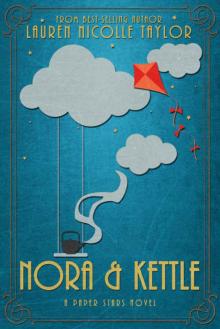Nora & Kettle


Author: Lauren Nicolle Taylor
Category: Young Adult
Published: 2016
Series:
View: 350
Read OnlineFans of Eleanor & Park and The Book Thief will love this startling and heart-warming take on Peter Pan.
What if Peter Pan was a homeless kid just trying to survive, and Wendy flew away for a really good reason?
Seventeen-year-old Kettle has had his share of adversity. As an orphaned Japanese American struggling to make a life in the aftermath of an event in history not often referred to--the internment of Japanese Americans during World War II and the removal of children from orphanages for having "one drop of Japanese blood in them"--things are finally looking up. He has his hideout in an abandoned subway tunnel, a job, and his gang of Lost Boys.
Desperate to run away, the world outside her oppressive brownstone calls to naïve, eighteen-year-old Nora--the privileged daughter of a controlling and violent civil rights lawyer who is building a compensation case for the interned Japanese Americans. But she is trapped, enduring abuse to protect her younger sister Frankie and wishing on the stars every night for things to change.
For months, they've lived side by side, their paths crossing yet never meeting. But when Nora is nearly killed and her sister taken away, their worlds collide as Kettle, grief stricken at the loss of a friend, angrily pulls Nora from her window.
In her honeyed eyes, Kettle sees sadness and suffering. In his, Nora sees the chance to take to the window and fly away.
Set in 1953, NORA AND KETTLE explores the collision of two teenagers facing extraordinary hardship. Their meeting is inevitable, devastating, and ultimately healing. Their stories, * a collection of events, are each on their own harmless. But together, one after the other, they change the world. *
**From School Library Journal
Gr 9 Up-Set in the 1950s, this book is told in the alternating voices of Nora, an upper-class teen struggling to protect her younger sister from their abusive father, and Kettle, a biracial homeless teen persecuted for being Japanese, caring for his makeshift homeless family. The two cross paths repeatedly without realizing until they meet late in the novel and discover they just might be the missing family they each didn't know they were searching for. This is a commendable attempt to present the persecution of Japanese Americans. However, the story's flaws outweigh its noble intentions. Both teen voices are expressed in the same adult tone, and the prose lacks the necessary sense of time and place. Many of the obstacles, such as Kettle's pursuit of work on the docks and Nora's ability to quickly adapt to hard physical labor after living a privileged existence, are easily resolved. VERDICT Pass on this historical fiction title for Kevin C. Pyle's Take What You Can Carry (Macmillan, 2012) or Jeanne Houston's Farewell to Manzanar (HMH, 2002).-Hillary St. George, Los Angeles Public Libraryα(c) Copyright 2011. Library Journals LLC, a wholly owned subsidiary of Media Source, Inc. No redistribution permitted.
Review
World War II is over, but community feelings toward Japanese Americans still run high, and two very different teens are struggling to live in the aftermath. Seventeen-year-old Kettle has been an orphan living on the streets for years, working the docks when he can and trying to care for other street children alongside his brother, Kin. Nora, on the other hand, is the daughter of a wealthy, big-name civil rights lawyer, but that does not protect her from his violent beatings behind closed doors. Existing side by side without knowing it, Kettle and Nora's paths cross one night, and suddenly everything changes. Lyrically written, this powerful and at times painful read captures the reader and does not let go. Told in alternating chapters from the two characters' perspectives, their respective narratives cross and intertwine, drawing Nora and Kettle closer until they finally unite. Parallels to Peter Pan and Wendy provide motif and depth without overwhelming the reader. Firmly rooted in the history of internment camps and racial prejudice, this remarkable novel educates subtly while focusing on themes of home, acceptance, courage, and the danger of secrets. -- Melissa Moore
(Booklist Starred Review)
What if Peter Pan was a homeless kid just trying to survive, and Wendy flew away for a really good reason?
Seventeen-year-old Kettle has had his share of adversity. As an orphaned Japanese American struggling to make a life in the aftermath of an event in history not often referred to--the internment of Japanese Americans during World War II and the removal of children from orphanages for having "one drop of Japanese blood in them"--things are finally looking up. He has his hideout in an abandoned subway tunnel, a job, and his gang of Lost Boys.
Desperate to run away, the world outside her oppressive brownstone calls to naïve, eighteen-year-old Nora--the privileged daughter of a controlling and violent civil rights lawyer who is building a compensation case for the interned Japanese Americans. But she is trapped, enduring abuse to protect her younger sister Frankie and wishing on the stars every night for things to change.
For months, they've lived side by side, their paths crossing yet never meeting. But when Nora is nearly killed and her sister taken away, their worlds collide as Kettle, grief stricken at the loss of a friend, angrily pulls Nora from her window.
In her honeyed eyes, Kettle sees sadness and suffering. In his, Nora sees the chance to take to the window and fly away.
Set in 1953, NORA AND KETTLE explores the collision of two teenagers facing extraordinary hardship. Their meeting is inevitable, devastating, and ultimately healing. Their stories, * a collection of events, are each on their own harmless. But together, one after the other, they change the world. *
**From School Library Journal
Gr 9 Up-Set in the 1950s, this book is told in the alternating voices of Nora, an upper-class teen struggling to protect her younger sister from their abusive father, and Kettle, a biracial homeless teen persecuted for being Japanese, caring for his makeshift homeless family. The two cross paths repeatedly without realizing until they meet late in the novel and discover they just might be the missing family they each didn't know they were searching for. This is a commendable attempt to present the persecution of Japanese Americans. However, the story's flaws outweigh its noble intentions. Both teen voices are expressed in the same adult tone, and the prose lacks the necessary sense of time and place. Many of the obstacles, such as Kettle's pursuit of work on the docks and Nora's ability to quickly adapt to hard physical labor after living a privileged existence, are easily resolved. VERDICT Pass on this historical fiction title for Kevin C. Pyle's Take What You Can Carry (Macmillan, 2012) or Jeanne Houston's Farewell to Manzanar (HMH, 2002).-Hillary St. George, Los Angeles Public Libraryα(c) Copyright 2011. Library Journals LLC, a wholly owned subsidiary of Media Source, Inc. No redistribution permitted.
Review
World War II is over, but community feelings toward Japanese Americans still run high, and two very different teens are struggling to live in the aftermath. Seventeen-year-old Kettle has been an orphan living on the streets for years, working the docks when he can and trying to care for other street children alongside his brother, Kin. Nora, on the other hand, is the daughter of a wealthy, big-name civil rights lawyer, but that does not protect her from his violent beatings behind closed doors. Existing side by side without knowing it, Kettle and Nora's paths cross one night, and suddenly everything changes. Lyrically written, this powerful and at times painful read captures the reader and does not let go. Told in alternating chapters from the two characters' perspectives, their respective narratives cross and intertwine, drawing Nora and Kettle closer until they finally unite. Parallels to Peter Pan and Wendy provide motif and depth without overwhelming the reader. Firmly rooted in the history of internment camps and racial prejudice, this remarkable novel educates subtly while focusing on themes of home, acceptance, courage, and the danger of secrets. -- Melissa Moore
(Booklist Starred Review)
 The Princess Stakes
The Princess Stakes Marked
Marked Locke (Corps Security 5)
Locke (Corps Security 5) Her Beast (Beauty and the Captor 1)
Her Beast (Beauty and the Captor 1) Filthy Twin Cowboys (Forbidden Fantasies 16)
Filthy Twin Cowboys (Forbidden Fantasies 16) Screw Me Sideways
Screw Me Sideways Indiscreet
Indiscreet Unsung Requiem
Unsung Requiem